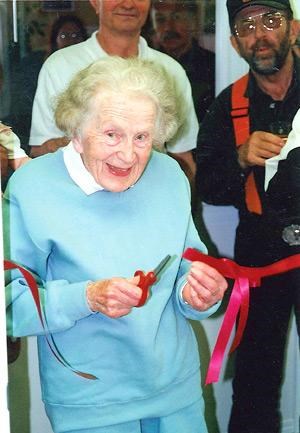One of inclusion Powell River’s founding members, Jean Pike, invited parents into her home in the early 1950s and that was the beginning of an association that has been providing services to people with intellectual challenges ever since. It’s fitting that her name is spoken every day as one of inclusion Powell River’s assets is named in memory of her tremendous contributions. Her involvement, started because of her son David, continued for many years.
Today, Jean Pike Centre for Children and Youth offers the kind of support that she and many other parents could only dream about for their own youngsters.
Along with Community Living Place, several group homes and administrative offices on Marine Avenue, the centre is part of a progressive organization, which has as its mission “To foster an inclusive community where everyone belongs and lives a good life.”
Each year approximately 250 children and families, 105 adults with intellectual challenges, two adults with acquired brain injury and 37 seniors receive services. Providing those services are about 100 regular and 100 casual employees. Some 85 per cent of the budget is paid out in wages to employees who live and spend the majority of their money in Powell River. Most of the remaining 15 per cent is spent on groceries, office supplies, other household items, taxes and utilities.
From an overdrawn bank account to a $7.5 million annual budget, inclusion Powell River today contracts with several government agencies, School District 47 and United Way BC to provide a wide range of supports to children and families, individuals with developmental disabilities or acquired brain injuries and seniors.
The local organization is a founding member of inclusion BC, which provides it with an advocacy voice to both provincial and federal governments.
“We believe it is important to be part of solutions for ensuring continuing service and supports for the people we serve,” said Lilla Tipton, inclusion Powell River executive director. “This advocacy has historically made the difference to where government decides to spend its revenue.”
In addition, inclusion Powell River fundraises and volunteers time for projects that do not qualify for government money. They include the Wish Fund from which individuals can request extra support for such things as a hospital bed, dentures, a trip to visit a family member, a camping trip, recreation or entertainment. Staff training opportunities, education initiatives to promote understanding of disability issues in the community, forums or discussion groups, free or subsidized events for self-advocates and families and implementing innovative development practices all require money that government funding does not cover.
Today, instead of only parents advocating for their children, there are adults who advocate for themselves, attending conferences and local discussion groups where their input is welcomed.
Several members of inclusion Powell River’s board of directors are self-advocates who contribute to the running of the organization.
The annual Festival of Trees, hot dog sales, a salad booth at Sunshine Music Festival and raffles are used to raise money. In addition, donations are solicited and grant applications submitted where relevant.
As happened from the very beginning, numerous volunteers lend their time and passion to the organization. That has never changed.
For more information about what is happening today with inclusion Powell River, readers are invited to visit its website.



